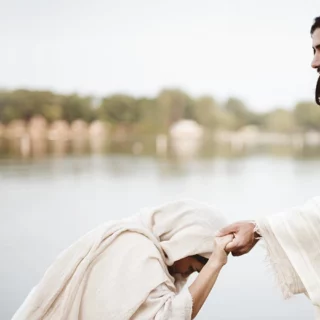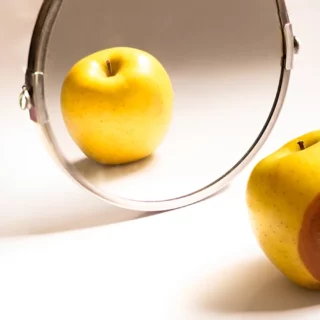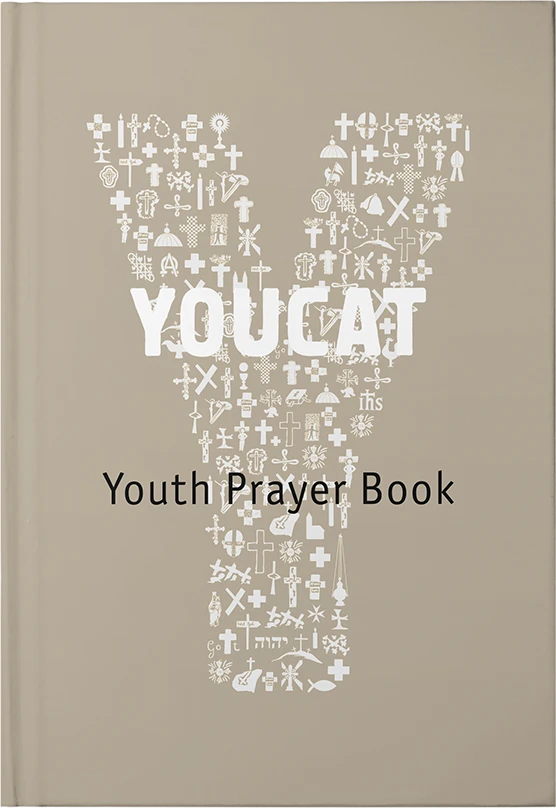

Credopedia
Conversion
Conversion in Christianity means the personal beginning with God. An up-to-date interpretation based on the Bible and the Catechism.
What's this?
Conversion in Christianity means a personal beginning with God – the voluntary decision to believe in Jesus Christ as true God and true man and to believe in everything that he has revealed. Conversion leads to baptism or it’s the way back to baptism. The converted person is enabled by the grace of God, to come to communion with God and to live a life that no longer ends. In YOUCAT 196 it says: A person who turns to Christianity is not just changing a world view. He travels a path of learning (the catechumenate), in which he becomes a new man through personal conversion, but especially through the gift of Baptism. He is now a living member of the Body of Christ.”
What does the Holy Bible say?
Jesus’ central concern is that people turn to God: “Repent, and believe the good news”. (Mark 1,15). In the Greek language of the New Testament, two words denote this conversion:
- epistrepho = to turn back, to return – for example, when John is said to “bring back many of the people of Israel to the Lord their God.” (Lk 1,16). Or when Peter addresses certain Christians as having “gone astray like sheep, but you have now returned to the shepherd and guardian of your souls.” (1 Pet 2,25) This refers to Jesus, the Lord.
- Even more important is the word metanoia = conversion, repentance, penance. The word is composed of two parts: noein = to think, and meta = to do after. What is meant is a new way of thinking, a rethinking. Jesus used the word 21 times, for example in Mk 1,15: “This is the time of fulfillment. The kingdom of God is at hand. Repent, and believe the good news.” With this repentance, Jesus wants to undo the fundamental disorder that separates people from God and heal it at its root. Without repentance this is not possible: “And he said: ‘Truly I tell you, unless you change and become like little children, you will never enter the kingdom of heaven.” (Mt 18,3)
A short YOUCAT-Catechesis
Then there will be a great party in heaven…
To the question “How do I actually become a Christian?” Someone could answer today: “Stupid question, it works automatically!” Nobody would have thought of that in early Christianity. “The standard answer would have been: “You have to convert!” There are many references to what that means from the first hundred years. There it is said, for example, that the person concerned must turn away from the “the empty way of life handed down to you from your ancestors,” (1 Peter 1,18); he must put aside the “put off your old self, which is being corrupted by its deceitful desires.” (Eph 4,22). One cannot be a Christian if one continues to be “immoral or greedy, an idolater or slanderer, a drunkard or swindler.” (1 Cor 5,11). To be a Christian means to come into deep communion with the living God – and what prevents us from doing so is what we call sin. In YOUCAT 231 it says: “What is required for the forgiveness of sins is the person who undergoes conversion.”
I believe that the first Christians were right: being a Christian is not an automatism by which one somehow slips into something. Being a Christian is a fundamental life change that culminates in baptism, but is willed from the depths of the human soul. If it were a trade, it would be a business in which one gives away everything to gain everything. Being a Christian is not an additional thing that is used to spice up everyday life and decorate it with a little bit of incense or meaning. It is the leap into a new reality in which we “may have life, and have it to the full.” (Jn 10,10)
There are no tricks
You could even say you don’t even have to convert. St. John-Marie Vianney (the Curé d’Ars) says: “If you really asked him for conversion, it would be given to you.” There has to be this first, fundamental turning point in life. But after that point, the theme remains with us, so that there will be conversion within conversion within conversion. This may deter some, but one can also see it differently: The beauty of the Christian faith is that all are beginners – or rather, the classless company of those with whom God wants to do something. Even the saints are beginners – and not experts who have it all together. Saints, by the way, are just regular people trying to live as God wanted until their sainthood is officially established after death. When Teresa of Avila, the greatest mystic of the Church, died in Alma de Torres in 1581, she considered herself the greatest sinner in the world. Perhaps rightly so. She had seen so much light, experienced such a deep union with God. And when one then goes back to normal human life it weighs doubly heavily. So it is anything but a pious lip service when the Pope regularly goes to confession. For every Christian, every day starts from zero. There are no professionals who start at level 7. And those who think they have the hang of it and are finally at level 7 should see that they get back onto the field and start again at zero as quickly as possible. There are no tricks. Being a Christian is not a trick.
Have I missed the boat? Really?
Some people think of themselves, of their own life story, and say to themselves: It’s too late for me, I’ve ‘missed the boat’! They believe they have too much baggage with them, too much-lived life, to really jump on this bandwagon. Besides, they have their pride. They don’t want, as Heinrich Heine put it, “to crawl to the cross”. You have to say: There are absolutely no preconditions for getting on this particular boat, it’s not without consequences. You don’t have to get a special ticket that requires you to undergo a talent test or a body check beforehand. Anyone can get on board, even if they are in a mess or just feel a mess, have a lot of debt, cannot cope with their emotional world, live in unsettled relationships or have more questions than answers. You can be divorced for the third, fourth, or fifth time, you can be addicted to alcohol, drugs and the internet (or all at the same time), you can have been a believer before and have lost your faith in the crowd. It doesn’t matter. Becoming a Christian does not require a perfect life – according to the motto: First, I’ll get my life in order, then I can show myself to God. You would never become a Christian that way. Whose life is already perfect? It is the here and now that counts – this moment, no matter what may have been before. Erik Peterson once pointed out that Jesus is surrounded by people with illnesses and shortcomings as if he had somehow attracted them. Having weaknesses is, so to speak, the permanent ‘permit card’ for access to Jesus. He cannot do anything with people who have no weaknesses. He who has no darkness does not long for light. And longing is what matters. In YOUCAT 408 it says: “God loves us in every moment, in every ‘complicated’ situation, even in a state of sin. God helps us to seek the whole truth about love and to find ways to live more and more unambiguously and decisively.” Luke’s Gospel says that there is ” there will be more rejoicing in heaven over one sinner who repents than over ninety-nine righteous people who do not need to repent.” (Luke 15,7) I like to think of that in concrete terms. You take one tiny step toward God here – and there will be a great party in heaven! …
What you get out of it
Believe it or not, in order to convince skeptics before they died, I once compiled a list of all the earthly, tangible benefits years ago – as I experienced them. I still read the list with inner approval. Here it is:
- You come into a deep inner joy.
- You start the day differently and leave it differently.
- You can look back without bitterness.
- You are needed.
- You feel secure in God.
- You have a clear view of things and get inner support.
- You can reconcile with your past.
- You become grateful.
- You can look into the future without fear.
- The Celebration comes into your life.
- You find peace in your soul.
- You have something to work on and fight for.
- You become immune to despair.
- You become a support for those around you.
- You can look up and know someone above you who loves you.
- You see through “chance” and feel guided by God.
- You discover your dignity and are freed from self-loathing.
- You make a lot of reliable friends.
- You know where to start when you are exposed to addictions and dependencies.
- You can think better.
- You find ancient rituals that are good for your soul.
- You feel freer.
- You see the world with new eyes and rejoice in creation.
- You experience blessings and protection.
- You become more loving and kind.
- Your fear of life and the future decreases.
- You receive strength for very long distances and difficult tasks.
- You can process emotional wounds well and deal with suffering better.
- You become part of a worldwide network – wherever you go, people welcome you as “one of us”.
- You will experience togetherness and hospitality beyond language and and national borders.
- You can lose more calmly.
- You can let go.
- You have an idea of what dying will be like.
- You find the courage to have an insane expectation of life …
What’s the catch?
The benefits sound great. But what’s the catch with the product? What price do you pay for it? Do you have to leave your mind at the door and walk through the world with blinkers on? Do you have to bend yourself to the limit? Do you have to say “yes” and “amen” to everything? Do you slide into groundless irrationalism? Does that mean you have to believe the sky is the limit? Do we end up in a fun-free zone, in a unique jungle of rules and regulations? Will everything that’s fun is cut off? Will you find the wrong people with the wrong music? Will it all be terribly exhausting? Well, No. There is no real catch, unless you expect a paradise without problems and with perfect people. Or you think that all you have to do is change the settings in your brain – and you would see the world through rose-tinted glasses. Millions of people sat in front of their screens in April 2005 when the new Pope Benedict XVI was introduced to his office. At that time, the 78-year-old man explicitly addressed young people. He pointed to his long life and experience and said, “Do not be afraid of Christ! He takes nothing, and he gives everything. Whoever gives himself to him will receive everything back a hundredfold.” He takes nothing and gives everything. Pope Benedict invited people into the Christian faith; and he found strong arguments for it: “We are not the accidental and senseless product of evolution. Each one of us is the fruit of a thought of God. Everyone is wanted, everyone is loved, everyone is needed. There is nothing more beautiful than being found by the Gospel, by Christ. There is nothing more beautiful than to know Him and to give friendship with Him to others.” I am gripped by this. Nevertheless, I would like to say: If you believe and want to put your life on new foundations – don’t do it to get any product advantages or because of the positive side effects. Don’t do it because of your emotional balance, not because you will then be able to cope with your fear better or because you will gain greater emotional stability. Especially don’t do it because you’re doing your mum, boyfriend, or girlfriend a favor.
Do it because God is there.
That is the only reason to take the “new path”. And to completely change the direction of travel for it.

YOUCAT Digital
Discover our digital products, which will help you to grow in faith and become missionaries yourself.







